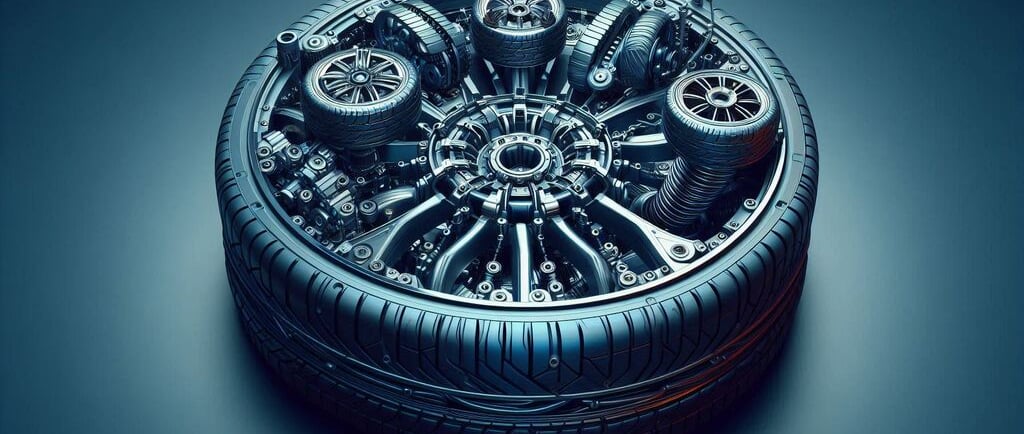Rims/Wheels: Metal or alloy wheel bases supporting tires.
When it comes to vehicles, rims or wheels are among the most important components that often go unnoticed.
TIRES AND WHEELS
11/13/20244 min read


Rims/Wheels: Metal or Alloy Wheel Bases Supporting Tires
When it comes to vehicles, rims or wheels are among the most important components that often go unnoticed. However, these wheel bases are crucial for supporting the tires, ensuring smooth performance, and impacting the overall aesthetic of your ride. Whether you're replacing a damaged rim or upgrading for improved performance, understanding the different types of wheels available—especially metal and alloy wheels—can help you make an informed decision.
What Are Rims/Wheels, and Why Are They Important?
At its core, a rim (or wheel) is the circular metal base that supports a tire. It provides structural integrity, helps transfer power from the engine to the ground, and plays a role in a vehicle’s overall handling, comfort, and safety. Rims come in various materials, with the two most popular being metal and alloy wheels.
The Role of Rims/Wheels
Tire Support: Rims hold the tires in place, ensuring they stay properly inflated and attached to the vehicle.
Vehicle Stability: Wheels help maintain proper alignment, aiding in the vehicle’s balance and handling.
Aesthetics: Wheels contribute to the overall appearance of a vehicle. Whether you're upgrading for performance or style, rims can give your car a fresh new look.
Without quality wheels, your vehicle would struggle with uneven tire wear, poor handling, and reduced safety. The material of the rim plays a huge part in both performance and durability, so choosing the right wheel is important.
Metal Wheels vs. Alloy Wheels
When selecting wheels, the material they are made of can significantly influence the ride quality, durability, and cost of the vehicle. The two primary types of wheels are metal wheels and alloy wheels. Here’s a breakdown of each:
Metal Wheels
Metal wheels, often referred to as steel wheels, are made from a single piece of steel. These wheels are heavier than alloy wheels and are often found on more budget-friendly or utility vehicles.
Advantages of Metal Wheels:
Durability: Steel wheels are incredibly strong and resistant to impacts, making them ideal for rugged conditions like off-roading or harsh weather.
Cost-Effective: These wheels are typically more affordable than alloy wheels, making them a popular choice for people on a budget.
Repairability: If damaged, steel wheels can often be repaired more easily and at a lower cost.
Disadvantages of Metal Wheels:
Weight: Steel wheels are heavier than alloy wheels, which can affect fuel efficiency and handling.
Aesthetic Appeal: While durable, steel wheels may not offer the same visual appeal as alloy wheels.
Alloy Wheels
Alloy wheels are made from a mix of metals, usually aluminum and other alloys, making them lighter and more performance-oriented compared to steel wheels. These wheels are common in luxury, sports, and high-performance vehicles.
Advantages of Alloy Wheels:
Lightweight: Alloy wheels are much lighter than steel wheels, improving fuel efficiency, acceleration, and handling.
Aesthetic Appeal: Alloy wheels come in various designs and finishes, offering better customization and an attractive look for your vehicle.
Better Heat Dissipation: The aluminum in alloy wheels helps dissipate heat better, reducing the risk of brake fade during high-speed driving.
Disadvantages of Alloy Wheels:
Cost: Alloy wheels tend to be more expensive than steel wheels, both in terms of initial cost and repairs.
Vulnerability: While alloys are stronger than they appear, they can be more prone to damage from impacts (e.g., potholes) compared to steel wheels.
How to Choose the Right Rim/Wheel for Your Vehicle
When selecting wheels for your car, consider factors such as driving habits, budget, and the specific benefits you need. Here’s how to make an informed decision between metal and alloy wheels:
1. Consider Your Driving Conditions
Off-Roading or Harsh Conditions: If you frequently drive on rough terrain or in areas with extreme weather conditions, metal wheels (steel) are your best bet due to their durability and impact resistance.
City and Highway Driving: If you mostly drive on smooth highways or in urban environments, alloy wheels might be the better choice for their lighter weight and superior aesthetics.
2. Performance Needs
For improved performance, especially in high-speed or sports vehicles, alloy wheels can enhance acceleration, handling, and overall driving dynamics. The reduced weight allows for better control and braking.
3. Budget Considerations
On a Tight Budget: If you’re looking to save money, steel wheels are a more affordable option and provide the durability you need.
Willing to Invest for Style and Performance: Alloy wheels, while more expensive, offer greater customization, lighter weight, and a smoother ride, making them an excellent investment for those who value both looks and performance.
Maintenance Tips for Rims/Wheels
Whether you choose metal or alloy wheels, regular maintenance will ensure your rims stay in good condition. Here are some tips:
1. Regular Cleaning
Dirt, brake dust, and road salt can accumulate on your wheels, causing damage over time. Clean your rims regularly with a non-abrasive cleaner to keep them looking their best.
2. Inspect for Damage
Check your wheels for cracks, dents, or bends regularly, especially if you drive through rough terrain. If you notice any damage, it’s essential to have your wheels inspected and repaired or replaced if necessary.
3. Tire Balancing and Alignment
Make sure your tires are properly balanced and aligned. Misalignment can cause uneven tire wear, which in turn, can affect your rims and overall vehicle performance.
4. Protect from Rust
For steel wheels, rust is a common issue. Applying a protective coating can help prevent rust from forming, especially if you live in areas with wet or salty conditions.
Conclusion: Choose the Best Rims/Wheels for Your Vehicle
Whether you opt for metal wheels or alloy wheels, the right rims are essential for supporting your tires, enhancing vehicle performance, and adding a touch of style. For budget-conscious drivers, steel wheels offer strength and cost savings, while alloy wheels are perfect for those looking for better performance, aesthetics, and lighter weight.
To keep your wheels in top shape, invest in regular maintenance and inspections. If you’re considering a wheel upgrade or replacement, take time to assess your driving needs and budget to find the ideal option for your vehicle.


